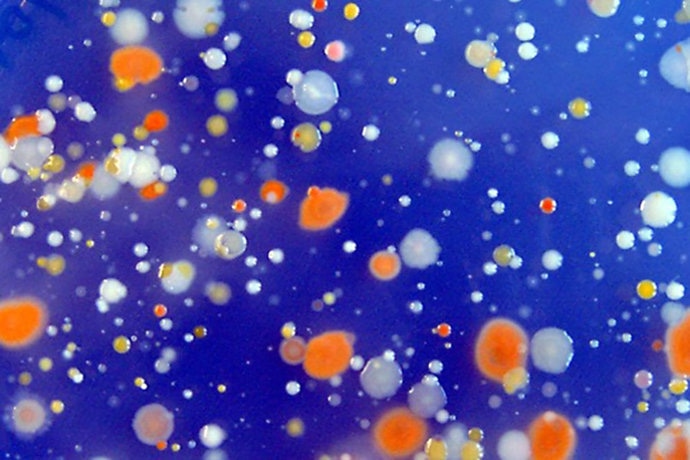Aug 8 2019
Researchers have discovered that marine bacteria with a unique metabolism may have an important role to play in the way Earth regulates climate.
 An artistic depiction (that has been enhanced for contrast) of the diversity of marine bacteria growing in colonies in the lab. (Image credit: Laura Gómez-Consarnau.)
An artistic depiction (that has been enhanced for contrast) of the diversity of marine bacteria growing in colonies in the lab. (Image credit: Laura Gómez-Consarnau.)
Headed by scientists at the University of Southern California (USC) Dornsife College of Letters, Arts and Sciences, the study found that marine bacteria containing a sunshine-grabbing pigment called rhodopsins are more profuse than previously believed.
Bacteria are different from algae and do not pull carbon dioxide from the air. Moreover, these microbes may increase in numbers in the warming oceans, indicating a shuffling of bacterial communities at the bottom of the food chain where the basic work of energy conversion takes place.
Oceans are important for climate change because they play a key role in the carbon cycle. Understanding how that works, and the marine organisms involved, helps us refine our climate models to predict climate in the future.
Laura Gómez-Consarnau, Assistant Professor (Research) of Biology, USC Dornsife
The results of the study have been published in Science Advances on August 7th, 2019.
Gómez-Consarnau is the main author of the study among an international group of researchers from California, Spain, China, and the United Kingdom.
Rhodopsins Could Impact Global Warming
The latest findings move away from the traditional concept of marine ecology seen in textbooks, which mentions that algae’s chlorophyll captures almost all the sunlight in the ocean. On the contrary, rhodopsin-equipped bacteria work just like hybrid cars, fueled by sunlight when nutrients are limited and by organic matter when available—as most microbes are.
In the latest study, the scientists trolled a 3,000-mile-long swath of the Mediterranean Sea and the eastern Atlantic Ocean in 2014, and subsequently sampled the pathogens in the water column down to 200 m. This was done to determine the abundance of these rhodopsins and the type of conditions they are favored.
The scientists discovered that rhodopsin photosystems were relatively more abundant than once thought and they were present in high concentration in nutrient-poor waters. Here, rhodopsins outperformed algae when it came to capturing light.
… In the future, the ocean will be more nutrient-poor as temperatures change. With fewer nutrients near the surface, algae will have limited photosynthesis and the rhodopsin process will be more abundant. We may have a shift in the future, which means the ocean won’t be able to absorb as much carbon as it does today. More CO2 gas may remain in the atmosphere, and the planet may warm faster.
Laura Gómez-Consarnau, Assistant Professor (Research) of Biology, USC Dornsife
To assess how these findings impact the capacity of the ocean to absorb greenhouse gases, CO2 fluxes in marine systems should be reevaluated and upcoming climate models should account for the role of rhodopsin-based metabolism, stated Gómez-Consarnau.
Study Details
Other USC Dornsife authors who contributed to the study are scientists Sergio A. Sañudo-Wilhelmy, Jed A. Fuhrman, Naomi M. Levine, and Lynda S. Cutter.
Additional authors are Deli Wang of the State Key Laboratory of Marine Environmental Science, Xiamen in China; John A. Raven of the University of Dundee in Scotland; Brian Seegers of the Scripps Research Institute in California; Josep M. Gasol of the Institut de Ciències del Mar-CMIMA (CSIC) in Spain; and Javier Arístegui of the Universidad de Las Palmas de Gran Canaria in Spain.
The study was funded by the Marie Curie Actions-International Outgoing Fellowships (#253970); a U.S. National Science Foundation grant (#OCE1335269); the Simons Foundation (#50972); the Gordon and Betty Moore Foundation Marine Microbiology Initiative (#3779); Project MAR in Spain (#CTM2011-30010-C02-MAR); and the University of Dundee as a registered Scottish charity (#SC015096).